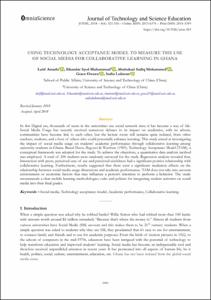Mostra el registre d'ítem simple
Using technology acceptance model to measure the use of social media for collaborative learning in Ghana
| dc.contributor.author | Amadu, Latif |
| dc.contributor.author | Muhammad, Sikandar Syed |
| dc.contributor.author | Mohammed, Abubakari Sadiq |
| dc.contributor.author | Owusu, Grace |
| dc.contributor.author | Lukman, Sadia |
| dc.coverage.spatial | east=-1.0231939999999895; north=7.946527; name=Pru, Ghana |
| dc.date.accessioned | 2018-11-16T12:43:45Z |
| dc.date.available | 2018-11-16T12:43:45Z |
| dc.date.issued | 2018-09 |
| dc.identifier.citation | Amadu, L. [et al.]. Using technology acceptance model to measure the use of social media for collaborative learning in Ghana. "JOTSE: Journal of Technology and Science Education", Setembre 2018, vol. 8, núm. 4, p. 321-336. |
| dc.identifier.issn | 2013-6374 |
| dc.identifier.issn | 2014-5349 |
| dc.identifier.uri | http://hdl.handle.net/2117/124587 |
| dc.description.abstract | In this Digital era, thousands of teens in the universities use social network sites; it has become a way of life. Social Media Usage has recently received numerous debates in its impact on academics, with its advent, communities have become link to each other, but the lecture room still remains quite isolated, from other teachers, students, and a host of others who could potentially enhance learning. This study aimed at investigating the impact of social media usage on students’ academic performance through collaborative learning among university students in Ghana. Based Davis, Bagozzi & Warshaw (1989), Technology Acceptance Model (TAM), a conceptual framework was adopted for the study. To achieve the objectives, a quantitative data analysis method was employed. A total of 200 students were randomly surveyed for the study. Regression analysis revealed that, Interaction with peers, perceived ease of use and perceived usefulness had a significant positive relationship with collaborative learning. Furthermore, results suggested that there exist a significant mediation effects on the relationship between social media usage dimensions and academic performance. TAM does not take into account environment or economic factors that may influence a person’s intention to perform a behavior. The study recommends a clear mobile learning methodologies, rules and policies for integrating student activities on social media into their final grades |
| dc.format.extent | 16 p. |
| dc.language.iso | eng |
| dc.publisher | OmniaScience |
| dc.rights | Attribution-NonCommercial-NoDerivs 3.0 Spain |
| dc.rights.uri | http://creativecommons.org/licenses/by-nc-nd/3.0/es/ |
| dc.subject | Àrees temàtiques de la UPC::Ensenyament i aprenentatge::Metodologies docents::Aprenentatge cooperatiu |
| dc.subject | Àrees temàtiques de la UPC::Ensenyament i aprenentatge::TIC's aplicades a l'educació |
| dc.subject.lcsh | Social media in education |
| dc.subject.lcsh | Collaborative Learning in Higher Education |
| dc.subject.lcsh | Team learning approach in education |
| dc.subject.other | Social media |
| dc.subject.other | Technology acceptance model |
| dc.subject.other | Collaborative learning |
| dc.subject.other | Academic performance |
| dc.title | Using technology acceptance model to measure the use of social media for collaborative learning in Ghana |
| dc.type | Article |
| dc.subject.lemac | Mitjans de comunicació social |
| dc.subject.lemac | Aprenentatge en equip en educació |
| dc.subject.lemac | Ensenyament -- Treball en equip |
| dc.identifier.doi | 10.3926/jotse.383 |
| dc.identifier.dl | B-2000-2012 |
| dc.description.peerreviewed | Peer Reviewed |
| dc.rights.access | Open Access |
| local.citation.publicationName | JOTSE: Journal of Technology and Science Education |
| local.citation.volume | 8 |
| local.citation.number | 4 |
| local.citation.startingPage | 321 |
| local.citation.endingPage | 336 |
Fitxers d'aquest items
Aquest ítem apareix a les col·leccions següents
-
2018, Vol. 8. núm. 4 [19]


